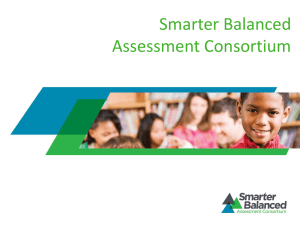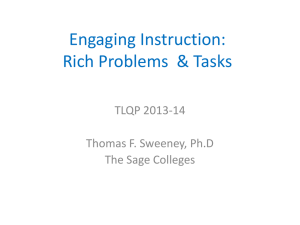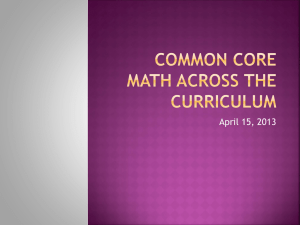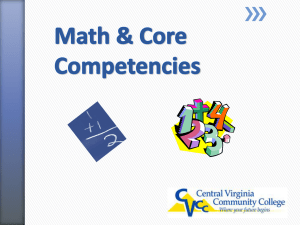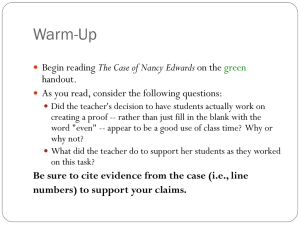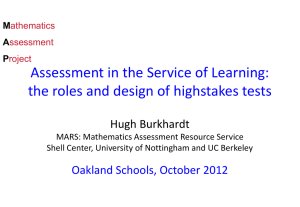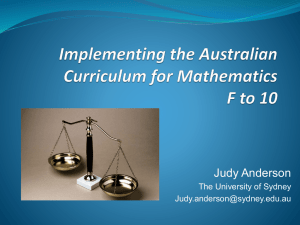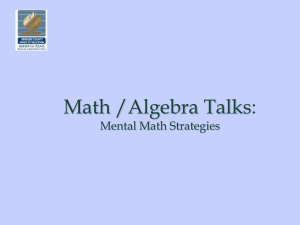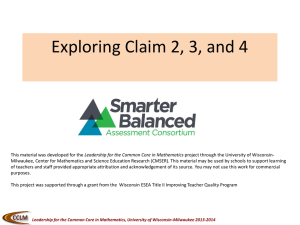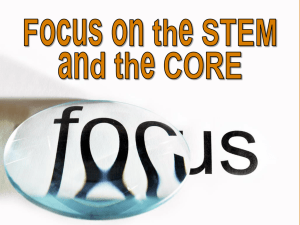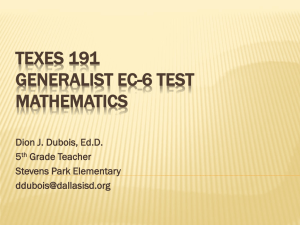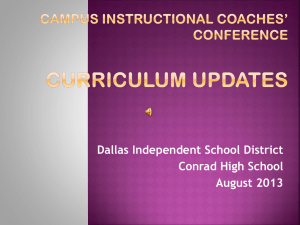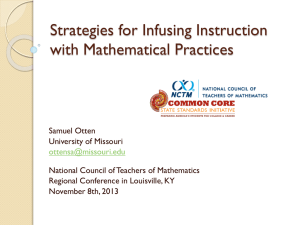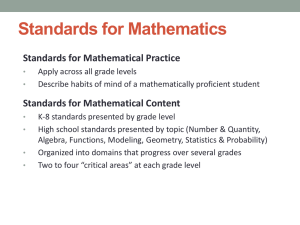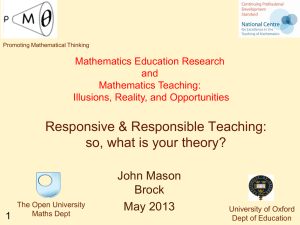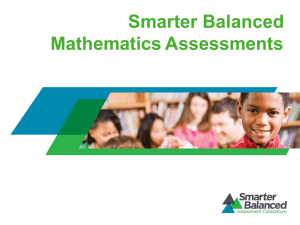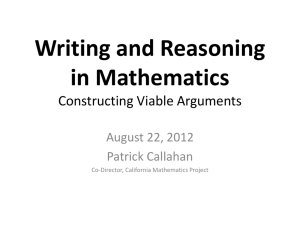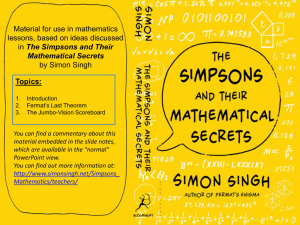Inquiry, Process and Practice in the Mathematics Classroom
advertisement
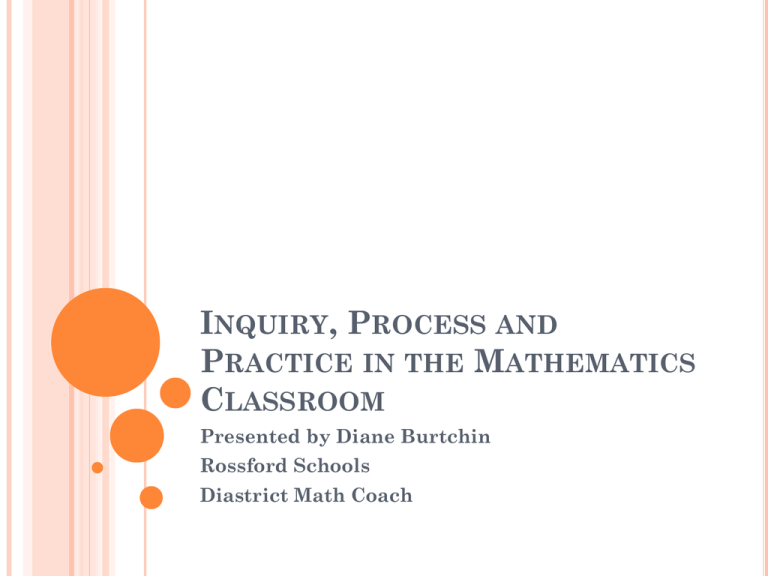
INQUIRY, PROCESS AND PRACTICE IN THE MATHEMATICS CLASSROOM Presented by Diane Burtchin Rossford Schools Diastrict Math Coach IMPORTANT INFORMATION Restrooms Handouts Seating arrangements Overview of the evening OUTCOMES Your My goals for the session goals for the session WHAT IS INQUIRY? Turn to an elbow partner and answer the following: What What is inquiry? does inquiry look like in the mathematics classroom? Provide specific examples. INQUIRY IS… Inquiry-based learning is a learning process through questions generated from the interests, curiosities, and perspectives/experiences of the learner. When investigations grow from our own questions, curiosities, and experiences, learning is an organic and motivating process that is intrinsically enjoyable. Taken from Inquiry Learn WHAT DOES INQUIRY LOOK LIKE IN THE CLASSROOM? The learner asks questions These questions lead to the desire for answers to the question (or for solutions to a problem) This results in the beginning of exploration and hypotheses creation These hypotheses lead to an investigation to test the hypotheses or find answers and solutions to the question and/or problem The investigation leads to the creation or construction of new knowledge based on investigation findings The learner discusses and reflects on this newlyacquired knowledge, which, in turn leads to more questions and further investigation THE MATHEMATICS CLASSROOM So turn back to your elbow partner and revisit your notes on what this looks like in the mathematics classroom. Are there any similarities between your list and what was just mentioned? Does this inquiry process remind you of anything regarding your mathematics curriculum/standards? THE PROCESS STANDARDS Problem solving Reasoning Communication Representation Connection THE PROCESS STANDARDS CONTINUED So what do these mean? What do they look like in the classroom? PROBLEM SOLVING The process of determining a method for arriving at a solution to a problem. This is the one we incorporate most naturally into our instruction and practice Real-world applicability But what is the process? Is there more than one? Does it change based on the grade level of the student? GOOD PROBLEM SOLVERS CAN… Translate words and situations into mathematical terms and representations Use/have a range of strategies and can select the most effective strategy for a given situation Can recognize when results do not make sense, solutions do not exist, and when results do not apply for particular situations Recognize the importance of checking solutions and know how to do so REASONING… Involves examining patterns, making conjectures about generalizations, and evaluating those conjectures Is critical in mathematics as well as other disciplines Includes creating mathematical arguments and supporting them Is the ability to evaluate reasoning and problem solving processes of self and others THOSE WITH GOOD REASONING CAN… Recognize patterns and categorize objects and data, and justify answers using reasoning and simple facts (in the earlier grades) Formulate conjectures and counter examples, and apply their reasoning techniques to mathematical ideas, concepts, and relationships (middle and later grades) Prove conjectures with formal inductive and deductive arguments, evaluate their own and others’ arguments and solutions, and make decisions (later grades) COMMUNICATION IS… Being able to explain orally and in writing about mathematical concepts Is an essential 21st century skill in all disciplines STUDENTS WITH GOOD COMMUNICATION CAN… Read for mathematical meaning Use mathematical terms, ideas, and concepts appropriately Share their own problem solving processes orally and in writing to clarify, organize, and reflect upon their own understanding Present their findings to peers and other audiences, explain their thought processes, and discuss how they arrived at a solution REPRESENTATION IS… Symbolic (using letters, numbers, equations, etc.) or visual (charts, graphs, physical objects, etc.) Being able to show a concept, problem, situation, etc. in a variety of ways Important to the ability to effectively communicate A PROFICIENT STUDENT IN REPRESENTATION CAN… Use physical objects to represent mathematical ideas such as fractions, decimals and percents (in the younger grades) and scientific notation to show very small and very large numbers (in the middle grades) Use graphs to represent mathematical ideas both with and without technology CONNECTIONS… Making connections between skills and concepts within mathematics Making connections between mathematical concepts and other disciplines and the outside world STUDENTS WHO DEMONSTRATE A KNOWLEDGE OF CONNECTIONS CAN… Connect prior learning to current learning Can see the importance of mathematics in other disciplines Draw upon specific process skills and use them in more complicated situations Take mathematical skills and apply them in other situations (for example, reading graphs in other subjects) THE “NEW” MATHEMATICAL PRACTICES Make sense of problems and persevere in solving them Reason abstractly and quantitatively Construct viable arguments and critique the reasoning of others Model with mathematics Use appropriate tools strategically Attend to precision Look for and make use of structure Look for and express regularity in repeated reasoning MATH PRACTICES So what should each of these Practices look like in the classroom? Pick ONE practice that you feel MOST comfortable with, turn to your elbow partner, and share your response. Then switch. Repeat for another ONE of the Practices you feel LEAST comfortable with. SO ARE THESE PRACTICES REALLY NEW? Complete the envelope activity with a partner or in a small group. Match the “new” Mathematical Practices to the “old” Process Standards. What do you notice? What “stays”? What is “new”? Other thoughts? PROCESSES VS. PRACTICES Problem Solving Make sense of problems and persevere in solving them Use appropriate tools strategically Reasoning and Proof Reason abstractly and quantitatively Look for and express regularity in repeated reasoning Critique the reasoning of others Communication Representation Construct viable arguments Model with Mathematics Connections Attend to precision Look for and make use of structure SO HOW ARE WE CURRENTLY IMPLEMENTING THE PROCESS STANDARDS INTO OUR TEACHING? Share with your grade-band group how you implement the process standards into your teaching (how often, in what way, your methods, assessment, level of comfort, etc.) IS IT ENOUGH? Do If we need to make changes? so, what do we need to change? PARCC Ohio has made a decision on the consortium it will use for the new CCSS assessments: PARCC Refer to handout of an overview of the PARCC plan Website: http://www.parcconline.org/parcc-content-frameworks Highlights: Computer-based; optional through course assessments; performance tasks prior to computer assessment; rapid reporting system to inform instruction and accountability Tossing around the idea of making them adaptive Starts with the content and is trying to build in the assessment through the Mathematical Practices ACTIVITY EXPLORATION BY GRADE BAND Look through the activity selected for your grade band. Discuss the following: How does it tie into the idea of inquiry? What process standards/mathematical practices are addressed by this activity? How could you modify it for classroom use? RICH TASK SEARCH Please go to www.insidemathematics.org (do NOT use Internet Explorer to open this…) and click on Tools for Educators. The choose a grade level that is closest to what you teach. Click on MARS tasks to see a variety of rich tasks for that grade level. Spend some time looking through these tasks (you might want to just open the Entire Toolkit Packet) and look for how these tasks incorporate the ideas of inquiry and the Mathematical Practices. MODEL CURRICULA Go to the ODE link from the COSMOS page http://cosmos.bgsu.edu/inquiryseries/decem berhandouts.htm Open up the PDF of the Model Curricula and go to your grade level or Content Area. Pay particular attention to the resources. Explore these looking for ones that also incorporate the ideas of inquiry and Mathematical Practices. QUESTIONS? If you have questions or need additional information, please contact me at: dburtchin@rossfordschools.org Thanks so much for your attendance and participation this evening!

